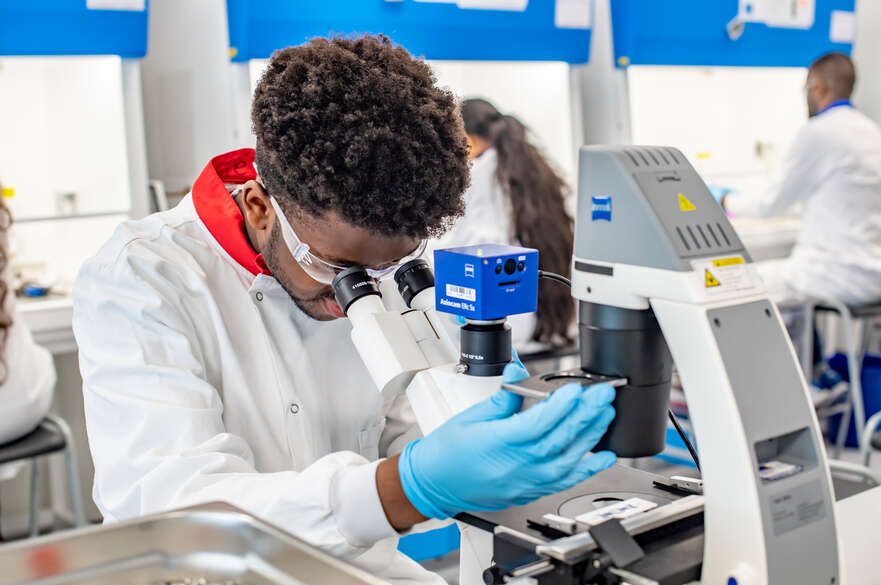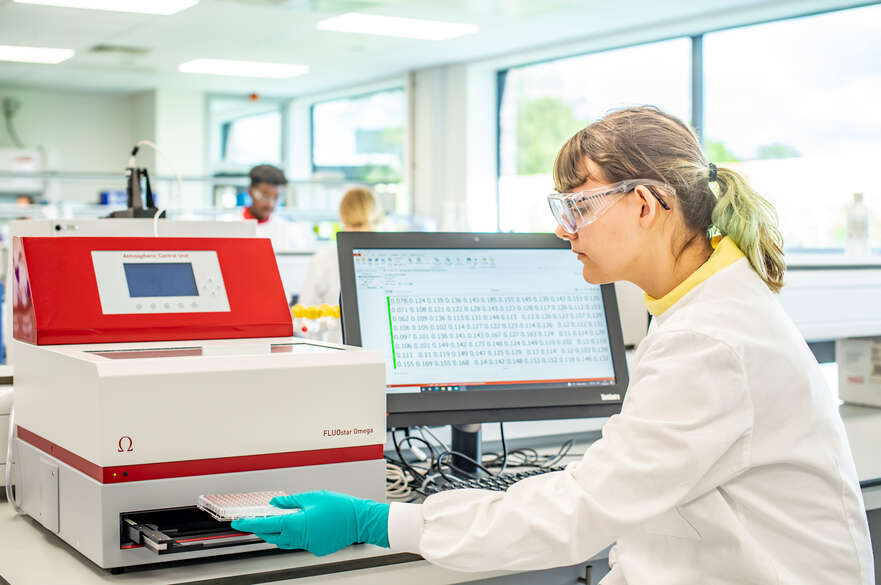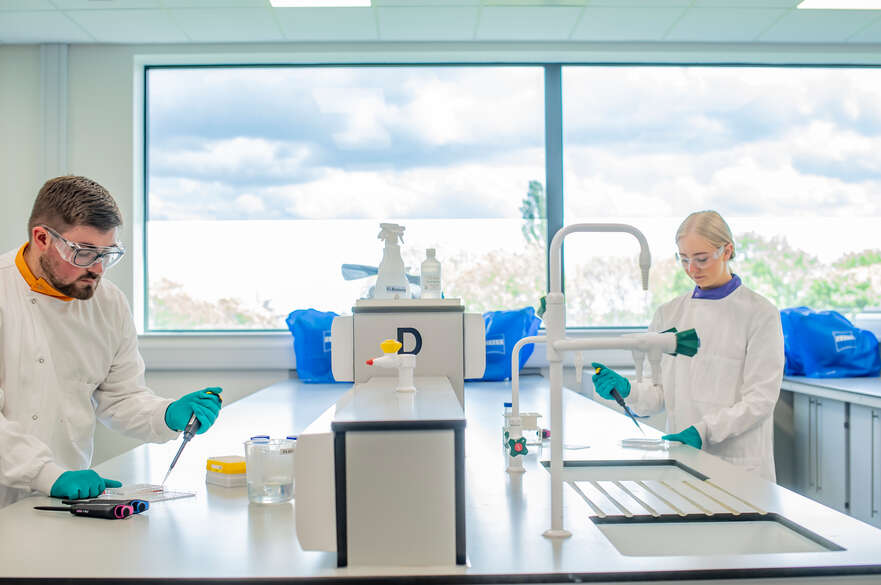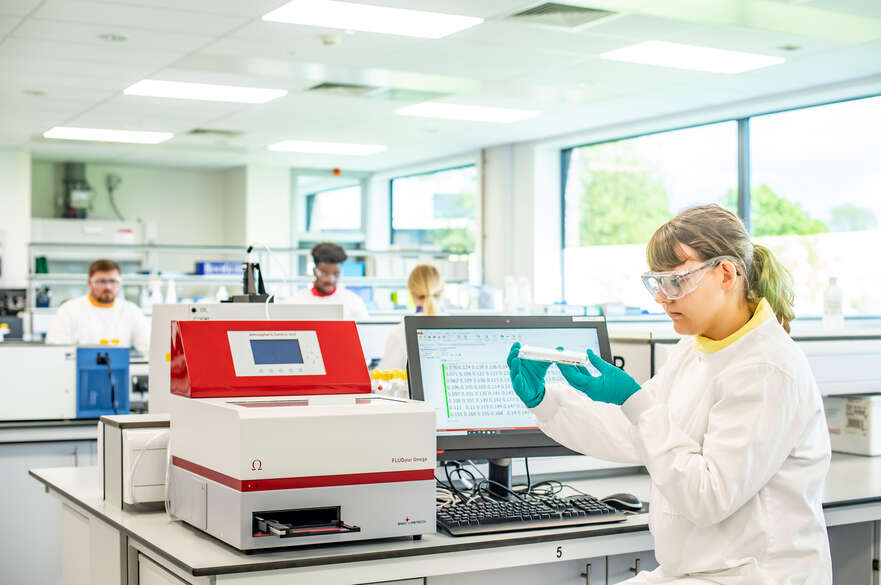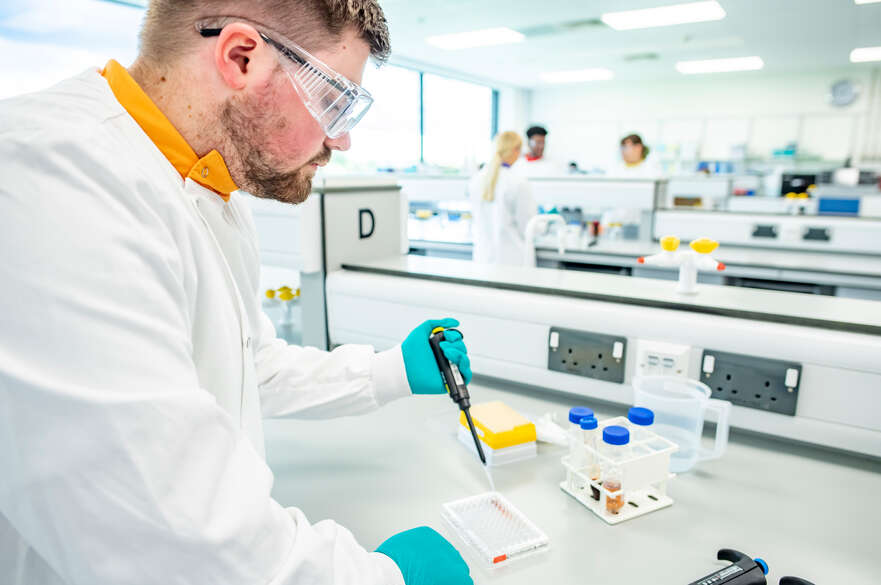This course is in Clearing
Offers from 80 tariff points
About this course
Microorganisms are miniscule living beings which are too small to see with the naked eye, and are integral to human, animal and plant life. They’re crucial to a range of industries which underpin human lifestyles, from food and drink production to medicine manufacture, and are the key to understanding disease. Microbiologists find ways we can use these microorganisms; develop innovative solutions to global problems like climate change, pollution and antibiotic resistance; and uncover the causes, behaviours and treatments of diseases.
On this BSc Microbiology degree, you’ll delve into the microscopic worlds of bacteria, fungi, single-celled parasites and viruses. Taking a medical and research-focused approach, you’ll get comfortable working in professional-standard labs, and learn how microbiology applies to industry, biotechnology and human society.
Here at NTU, your learning will be hands-on. You’ll become a competent microbiologist, with all the technical knowhow, transferable skills and specialist knowledge you need to lead and assist in some of today’s most crucial research.
What you’ll study
This microbiology course has the very latest medical research and real-world application at its core. You’ll hone your practical lab skills as you handle, grow and identify microbes safely; learn how to conduct your own academic research; get to grips with computer-based microbiology; and delve into all aspects of infectious disease — from diagnostics, outbreak and spread to control, treatment and prevention.
You’ll also explore specialised topics such as microbial genetics and metabolism, antibiotics, immunology, virology, bioinformatics, synthetic biology, and environmental, forensic and molecular microbiology.
Some highlights of our microbiology degree include:
- An applied and medical-focused approach to microbiology, exploring its industrial uses and discovering the breadths of infectious disease.
- Accreditation from the Royal Society of Biology (RSB), giving you free RSB membership for a year after graduation, boosting your career prospects, and promising high-quality teaching.
- Research-led teaching from experienced microbiologists at the top of their fields, with opportunities to work on their active research projects and even co-author publications.
- Consistently high student satisfaction ratings, praising our friendly lecturers, the expertise and enthusiasm of all our teaching staff, and the community feel amongst our students.
- The chance to build your professional network and connect with employers within bioscience industries, via field trips, guest speakers, placements and more.
- Opportunities to do summer studentships, which provide you with even more hands-on lab experience and bolster your employability prospects.
- A range of outreach opportunities to take part in, which may include Science In The Park, visits to local schools and presentations at conferences.
- The option to do a placement year — previously, students have worked for NHS clinical laboratories, research companies and drinks manufacturers.
Practical Techniques for Biology
Considers the principles of experimental design, data collection and analysis, including techniques in centrifugation, chromatography, electrophoresis, microscopy and radiobiology.
Genetics and Immunology
Develops genetic concepts and introduces basic aspects of the immune system, including the molecules, cells and interactions involved.
Introduction to Microbiology
Introduces you to the key concepts of microbiology and the defining characteristics of bacteria and viruses, as well as safe working practices with microbes.
Living Systems
Introduces levels of biological organisation from molecules to cells and ecosystems, providing a platform of knowledge and skills upon which other modules are developed.
Introduction to Biochemistry
Study the key aspects of macromolecules, cell structure and function, and interrelationships in both practical and theoretical contexts.
Introduction to Physiology
Introduces the physiology of human organ systems (respiratory, nervous, cardiovascular, urinary, endocrine and muscular) and examines the process of homeostasis.
Applied Microbiology
Reviews the use of micro-organisms in the production of industrially important products and biofuels, and considers lactic acid bacteria and the production of fermented products.
Clinical and Public Health Microbiology
Learn the importance of microbial infections, how they might be diagnosed, the sources of these infections and how sterilisation and disinfection procedures can be used to control them.
Microbial Metabolism and Genetics
Investigate the energy-yielding mechanisms in aerobic, anaerobic and fermentative systems and their diversity and importance to humans.
Microbial Structure, Identification and Distribution
Explore the function of important subcellular structures of micro-organisms, as well as the taxonomy and identification of the main groups of bacteria, fungi and viruses relating to forensic investigations.
Host-Pathogen Interactions
Explore ways in which pathogenic organisms and their human hosts interact with each other, and learn how we might exploit this knowledge to develop new drugs and vaccines.
Professional Skills in Microbiology
Explores current "hot topics" such as emerging infectious diseases, antimicrobial resistance and food security.
Optional year-long work placement. If you are not taking a placement, you will progress directly to your final year in year three.
Forensic Microbiology
Learn the molecular methods of microbial identification and see its role in accidental and deliberate contamination investigations, quality of data collection, analysis and presentation of evidence.
Molecular Microbiology
Study advanced concepts in bacterial genetics, including regulation of bacterial gene expression, molecular biology of bacterial pathogenesis and the application of knowledge in industry.
Immunology and Virology
Study advanced concepts in immunology, including immune responses to infection, cancer and autoimmunity. You’ll also look at concepts in the molecular biology of viral infections.
Infectious Diseases and their Control
Learn about the global importance of infectious diseases, their effect on individuals and the population as a whole and how they can be controlled.
Research Project (40 credit points)
You have the option of either completing a 40 credit point project / dissertation.
Your daily work pattern will be more variable in this year, since time will be set aside for you to carry out your project, and is likely to average about 16 hours per week, of which well over half is practical work.
We regularly review and update our course content based on student and employer feedback, ensuring that all of our courses remain current and relevant. This may result in changes to module content or module availability in future years.
Don’t just take our word for it, hear from our students themselves
Video Gallery
How you're taught
Your teaching team will consist of over ten dedicated microbiologists, who aren’t just academics — they’re highly experienced researchers, experts in industrial microbiology, and teaching award-winners and nominees. They’re all talented specialists at the forefront of their fields, who regularly publish their work in respected journals.
Because of this, your teaching on this microbiology degree will have a strong focus on their research interests, meaning you’ll be learning straight from the source. Some active research topics include antimicrobial resistance, evolution and genetics, the human microbiota, genome sequencing, machine learning, biotechnology, the molecular mechanisms of disease, and neglected pathogens.
You’ll learn through a mix of:
- practical laboratory classes, where you’ll learn workplace lab skills, put theory to the test, and get involved in real-world research projects
- lectures, covering the breadth of the subject
- seminars, for doing group work and delving deeper into your modules
- IT workshops for learning bioinformatics skills
- field trips, which have previously included local brewery tours to learn about industrial microbiology and an international trip to clinical labs in Uganda
- guest speakers, including microbiologists from organisations such as the NHS, Source BioScience and Yakult.
How you're assessed
The assessments on our microbiology degree are designed around the kind of work you’ll do in research and industry, so they include scientific posters, presentations, diagnostic and client reports, data analyses, an employability pitch, skills portfolios, reflections and written research papers. Most assessments are open book, to better simulate real-world scenarios and test your deeper understanding.
Contact hours
Overall, you’ll get around 240 hours of contact time each year. This microbiology course is very practical and you’ll spend lots of time in our industry-standard laboratories, with most modules including at least nine hours of labs (but often 12 to 15 hours). Outside of your timetabled sessions, you’ll work on your assignments independently or in groups, but your tutors will still be available to give you guidance and support.
Careers and employability
A microbiology degree opens doors to careers spanning a range of industries. These include disease diagnostics and control, environmental testing, food safety and manufacturing, molecular biology, epidemiology, biotechnology, therapeutics, and industrial research and development. But thanks to the highly desirable transferable skills you’ll develop on your microbiology course, your options aren’t limited to this field alone. In fact, some of our graduates work in science communication, publishing, finance, patent law and quality assurance.
You may also choose to further your education or pursue academia, with several of our recent students having published research papers, taken up research assistant posts, and secured funded PhDs at prestigious institutions.
Some examples of companies our graduates work for include AstraZeneca, the NHS, Dexcel Pharma and Premier Analytical Services.
What’s more, as a student at NTU, you’ll be supported by our award-winning Employability services for up to three years after you graduate, and get access to our online career resources for life.
Campus and facilities
You’ll mainly be studying in lecture theatres, classrooms and Class II laboratories across the Clifton Campus, with access to research-grade equipment including PCR machines, automated gel documentation systems, anaerobic cabinets and tissue culture hoods. Each lab has its own dedicated technical team to support your classes.
Our self-contained, community-focused Clifton Campus has been designed to keep you busy between lectures. Catch-up with your coursemates in the Pavilion’s barista café and Refectory; brainstorm group presentations in chic and stylish study spaces; or enjoy some proper R&R in The Point, home of our Students’ Union. The campus also hosts the multimillion-pound Clifton Sports Hub, offering great options for everyone — whatever your interests, and however competitive you’d like to get!
Just a short bus ride away, you’ll find the heart of Nottingham — a vibrant student city full of history, culture and well-kept secrets to discover at your leisure.
Entry requirements
This course is in Clearing
Looking for a place in Clearing? We are accepting application and would love to hear from you!
UK students
This course is in Clearing
Looking for a place in Clearing? We are accepting applications and would love to hear from you!
Clearing requirements
From 80 UCAS tariff points from up to 4 qualifications.
To discuss our entry requirements and see what we can offer you, call us now on +44 (0)115 848 6000. Alternatively, if you already have your qualifications, apply online via our Clearing Application form.
Preparing for results day? Beat the queue and sign up for NTU Priority for up-to-date information about all things Clearing. You’ll get an offer ahead of Clearing, subject to you achieving the required grades on results day.
- 80 UCAS Tariff points from up to four qualifications (two of which must be A-level equivalent including Biology grade D).
To find out what qualifications have tariff points, please use our tariff calculator.
Additional requirements for UK students
There are no additional requirements for this course.
Contextual offers
If you don’t quite meet our entry requirements, we might be able to make you a lower offer based on a range of factors, including your background (such as where you live and the school or college you attended), your experiences and your individual circumstances (you may have been in care, for example). This is called a contextual offer, and we get data from UCAS to help make these decisions. We do this because we believe everyone with the potential to succeed at NTU should have the opportunity to do so, no matter what barriers you may face.
Meeting our entry requirements
Hundreds of qualifications in the UK have UCAS Tariff points attached to specific grades, including A-levels, BTECs, T Levels and many more. You can use your grades and points from up to four different qualifications to meet our criteria. Enter your predicted or achieved grades into our Tariff calculator to find out how many points your qualifications are worth.
Other qualifications and experience
NTU welcomes applications from students with non-standard qualifications and learning backgrounds, either for year one entry or for advanced standing beyond the start of a course into year 2 or beyond.
We consider study and/or credit achieved from a similar course at another institution (otherwise known as credit transfer), vocational and professional qualifications, and broader work or life experience.
Our Recognition of Prior Learning and Credit Transfer Policy outlines the process and options available for this route. If you wish to apply via Recognition of Prior Learning, please contact the central Admissions and Enquiries Team who will be able to support you through the process.
Getting in touch
If you need more help or information, get in touch through our enquiry form.
International students
This course is in Clearing
Looking for a place in Clearing? We are accepting applications and would love to hear from you!
Clearing requirements
From 80 UCAS tariff points from up to 4 qualifications.
To discuss our entry requirements and see what we can offer you, call us now on +44 (0)115 848 6000. Alternatively, if you already have your qualifications, apply online via our Clearing Application form.
Preparing for results day? Beat the queue and sign up for NTU Priority for up-to-date information about all things Clearing. You’ll get an offer ahead of Clearing, subject to you achieving the required grades on results day.
- Academic entry requirements: 80 UCAS Tariff points from up to four qualifications (two of which must be A-level equivalent including Biology grade D). We accept equivalent qualifications from all over the world. Please check your international entry requirements by country.
- English language requirements: See our English language requirements page for requirements for your subject and information on alternative tests and Pre-sessional English.
Additional requirements for international students
If you need help achieving the academic entry requirements, we offer a Foundation preparation course for this degree. The course is offered through our partner Nottingham Trent International College (NTIC) based on our City Campus.
English language requirements
View our English language requirements for all courses, including alternative English language tests and country qualifications accepted by the University.
If you need help achieving the language requirements, we offer a Pre-Sessional English for Academic Purposes course on our City campus which is an intensive preparation course for academic study at NTU.
Other qualifications and experience
If you have the right level of qualifications, you may be able to start your Bachelors degree at NTU in year 2 or year 3. This is called ‘advanced standing’ entry and is decided on a case-by case basis after our assessment of your qualifications and experience.
You can view our Recognition of Prior Learning and Credit Transfer Policy which outlines the process and options available, such as recognising experiential learning and credit transfer.
Sign up for emails
Sign up to receive regular emails from the International Office. You'll hear about our news, scholarships and any upcoming events in your country with our expert regional teams.
Getting in touch
If you need advice about studying at NTU as an international student or how to apply, our international webpages are a great place to start. If you have any questions about your study options, your international qualifications, experience, grades or other results, please get in touch through our enquiry form. Our international teams are highly experienced in answering queries from students all over the world.
Policies
We strive to make our admissions procedures as fair and clear as possible. To find out more about how we make offers, visit our admissions policies page.



